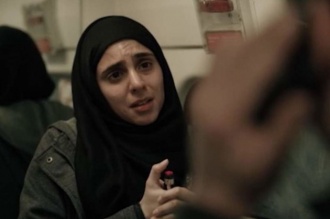This is the last article you can read this month
You can read more article this month
You can read more articles this month
Sorry your limit is up for this month
Reset on:
Please help support the Morning Star by subscribing here
IN THE 1990s sitcom Nightingales, the apparently harmless lead characters were occasionally transformed into evil Shakespearean villains. Lightning flashed and the set filled with smoke, while the cast hissed murderous plot lines in iambic pentameter and struck poses from Laurence Olivier’s version of Richard III.

This was deliberately risible, unlike the pivotal moment in the final episode of the BBC series Bodyguard, which was unintentionally absurd. It involved the police interrogation of Nadia (Anjli Mohindra, pictured), a young Muslim woman arrested in a thwarted terrorist incident five episodes earlier.
At that stage, writer Jed Mercurio portrayed Nadia as a bullied and frightened young woman with no commitment to any political or religious cause and no sense of agency. Wrapped in a suicide vest, hiding in a train toilet and wide-eyed with fear, she was a classic TV victim.
But in the climactic scene she suddenly narrowed her eyes, adopted a smug smirk and morphed into a hybrid of Lady Macbeth and Keyser Soze from The Usual Suspects. It was as ridiculous in tone as it was in terms of dramatic coherence.
Nadia fooled us all. She was a ruthless, fanatical and scheming jihadi, collaborating with the criminal underworld to strike a blow for political Islam, but this was an unearned dramatic twist. Her initial actions no longer made sense, the motivation for the suicide vest incident was gone. And the idea of her well-developed gangland connections was utterly unconvincing.
Narrative logic was not the only problem. Muslim women are the colleagues we depend on. They are people who teach, write, drive buses, serve as MPs and work as doctors, but the six episodes of Bodyguard, with its dense plotting and impressively choreographed violence, offered two clapped-out stereotypes — oppressed wife and irrational, vicious jihadi.
The final image of Nadia snarling and smirking plays on irrational fears about minority groups threatening “our” way of life and supports the Islamophobic agenda of Katie Hopkins, Tommy Robinson and Ukip. It is reminiscent of the trope of Irish terrorists used repeatedly in the 1980s to foster a sense of threat and unsettle TV audiences.
The first few episodes offered the intriguing possibility of a conspiracy based on ambition, infighting and scandal in the Conservative government, with branches of the security services appearing to be manoeuvring “friendly” politicians into positions of power.
But the anticipated exploration of democracy and the deep state did not play out. Instead, the murder of a “tough on crime” Tory Home Secretary, portrayed as an essentially decent woman, was brokered by gangsters and terrorists working collaboratively to protect their turf. All a bit safe, all a bit predictable.
Finally, order was restored by a heroic cop whose corrupt boss failed to take him seriously. Clint Eastwood in The Gauntlet anyone?
Bodyguard was a very conservative drama in terms of ambition, originality and politics. It has been lauded by The Daily Telegraph as “the biggest drama on British TV in over a decade.” “Viewers are begging the BBC for more,” the Manchester Evening News claimed and it's been hyped to the max by the Sunday Express, Metro, the Sun and, of course, the Daily Mail.
Some critics have claimed it is the equal of classic political thrillers such as Dead Head, Edge of Darkness, State of Play and A Very British Coup.
This is preposterous — great drama challenges lazy thinking, it doesn’t casually confirm it.











